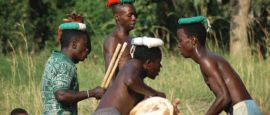Burundi History, Language and Culture
History of Burundi
The Hutu and Tutsi ethnic groups have occupied the area now known as Burundi for many centuries, but in the early 19th century the region became part of German East Africa and was ruled by the Germans until the end of WWI.
The Belgians took over after the war and continued what the Germans had started: namely a perverse programme of ethnic segregation. The minority Tutsi were given the highest positions in society, dominating the army, civil service and higher reaches of the economy, while the majority Hutu were largely discriminated against and excluded from positions of power. This segregation precipitated the 1994 genocide in neighbouring Rwanda, which was also ruled by Germany and Belgium, and has led to chronic instability in Burundi. The antagonism has occasionally flared up into mass violence and the massacre of tens of thousands, especially in 1972 and 1988.
Multiparty elections for a National Assembly were held in 1993, which resulted in President Pierre Buyoya replaced by the Hutu banker Melchior Ndadaye, who was killed later that year in unsuccessful military coup. Things continued in that violent vein in 1994 when President Cyprien Ntaryamira, another Hutu, was killed with Rwandan president, Juvénal Habyarimana, when their plane was shot down over Kigali.
The incident is widely seen as the trigger for the Rwandan Genocide in which some one million Rwandans died. Burundi narrowly avoided the same fate, although tensions between Tutsis and Hutus sharply increased, and the civil war that followed claimed 300,000 lives.
Two years later, Buyoya took over once again in another coup. The guerrilla war between Hutu rebels and the Tutsi-dominated army intensified. However, mediation efforts by Tanzania and personal intervention by Nelson Mandela served to pacify things in 2000, with a final settlement in 2001. A transitional government, jointly led by Buyoya and FRODEBU leader Domitien Ndayizeye, held power until 2003, when Ndayizeye became the country's sole leader.
In 2005, Pierre Nkurunziza was elected president, but his leaderships has failed to bring stability to the country – in fact Burundi witnessed extreme violence after the 2015 elections, which saw Nkurunziza win a controversial third term. Since then the country’s long-suffering citizens have endured hunger, disease and violence, pushing Burundi towards what the UN describes as a major crisis.
Did you know?
• Burundi remained one of Africa’s few kingdoms until four years after independence. The last king was Ntare V.
• Its two national parks, Kibira and Ruvubu, were founded in 1982.
• The first Europeans to visit the area were the British explorers John Hanning Speke and Richard F Burton in 1858.




 You know where
You know where